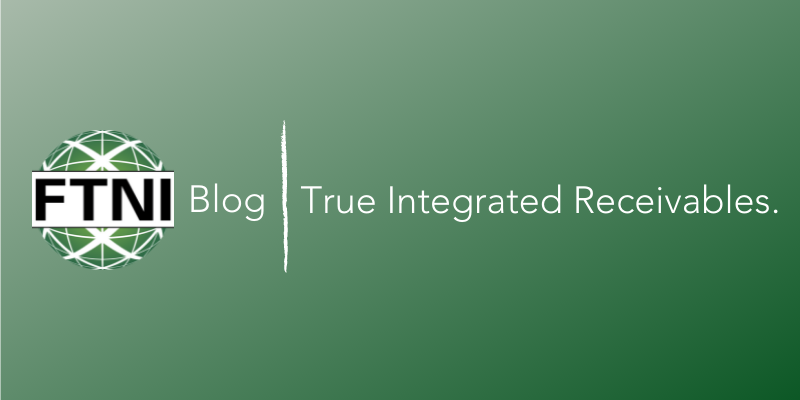Contact Sales (402) 933-4864
Contact Sales (402) 933-4864
Written by: Zac Robinson
.png?width=850&name=Win-Win-Win%20Blog%20Image%20(1).png)
For a growing number of banks, the accelerating demand for integrated receivables solutions, and the vast operational benefits this technology delivers corporate banking customers, is no longer something that can simply be added to a bank’s road map for future consideration.
According to recent research from the Aite Group, 73% of corporate treasury professionals cite a bank's ability to provide an integrated receivables offering as 'important' or 'extremely important', when selecting a new banking partner. As would be expected, in response to this growing demand, 70% of banks rank integrated receivables technology as a 'high' priority.
Whether offering receivables processing solutions to corporate banking customers, managing internal banking AR operations, or working with lockbox and other technology partners, banks must continue to find new ways to innovate—and ultimately streamline—the solutions they bring to market in order to remain relevant in an increasingly competitive marketplace. Bringing new technology (like integrated receivables) to corporate customers is one of the ways that banks can deliver value-added solutions to customers. This also helps to significantly reduce the risk of losing key corporate customers to rival banks who have already made the move to implement and offer such solutions.
In order to successfully evolve Treasury Management and Accounts Receivables (AR) offerings to support corporate banking customers’ ever-growing needs, banks are being asked to deliver a comprehensive—and easily integrated—range of receivables processing services and solutions.
In our opinion, there is perhaps no better place for banks to start than with replacing legacy remote deposit capture (RDC) offerings with advanced RDC solutions. For years, corporate banking customers have grown accustomed to looking to their banking partners for RDC solutions. This is often the foundation upon which AR processing operations are built. But as time passes, and customers’ businesses grow and evolve, support for more robust RDC and remittance scanning solutions, as well as the ability to accept additional payment methods and channels has been required.
Banks have answered this call largely with the addition of new solutions and services, often times delivered from numerous different platforms or vendors. This creates a complex and disparate patchwork of systems that both the bank, and more specifically, its customers are left to manage.
As new technologies become available, it will only continue to get harder and harder to improve or even maintain these siloed, legacy systems. Not to mention the effort required to integrate new payment methods and channels with customers’ back-office systems each time a new system is added. And corporate customers who’ve bought more than one of the bank’s services will be stuck having to manage multiple platforms (including multiple reports and reconciliation points), which leads to disjointed and frustrating experiences for customers and banks alike.
It’s time to break down these silos by partnering with a solution provider who can help you set a course towards delivering corporate banking customers with truly integrated receivables solutions delivered from a single platform.
Each Customer is Unique, Treat Them That Way
There is no “one size fits all” option when it comes to serving corporate customers’ AR needs. Especially customers of differing sizes, operating in different industries. Banks knows this. But for years, banks have offered Treasury and Cash management solutions that have lacked the flexibility corporate customers ultimately need in order to be successful and achieve optimal levels of efficiency within their AR operations. It’s time for this to change. And it’s easier (and more affordable) than you might think.
Each customer’s needs are unique, and we believe being able to serve these unique needs with highly-flexible, easy-configurable AR processing solutions delivered from a single, SaaS-based platform is what will set your bank’s Treasury and Cash Management solution sets apart from your competition.
Start with RDC and Grow Strategically
More than ever before, the time-tested routine of invoice and check within traditional AR processes has officially been disrupted as the world races towards electronic payments. Disrupted, yes. But not dead. The ability to efficiently and cost-effectively manage check payments and corresponding remittance documents, is still—and will continue to be—the foundation of successful AR organizations.
For businesses who have found themselves lured by the siren song of “checks are dead,” they may be feeling a little jaded these days, seeing as checks still account for almost 50% of B2B payments1. This is especially true for those companies in industries that don’t align particularly well with accepting payment via credit card due to the fees associated with high ticket sales and low-margin profits. These companies understand the value of moving more of their receivables to electronic payments in hopes of achieving higher levels of automation within their AR operations, but tend to favor ACH over credit cards. In fact, ACH now accounts for 32% of B2B payments, up from 22% in 20141. And NACHA predicts that this trend will continue to grow, predicting ACH will account for 45% of B2B payments by 20201.
As businesses have been pressed by their customers to support a growing number of payment methods (Checks, ACH, Credit Card, Debit Card, Cash, etc.) and payment channels (mailed-in, called-in, in-person, online, mobile), they’ve been forced to adopt multiple payment processing solutions and platforms to keep up with customer demands.
What they’ve been left with is a maze of disparate systems and legacy software that is causing increased complexity, minimal or no integration between platforms, a lack of consolidated reporting, extensive reconciliation points, and ever-increasing costs for maintenance, training and support. And the problem isn’t going to get any better if left alone—the cost of U.S. companies using siloed receivables and payment processing systems has been estimated to exceed $1B each year.
As companies work to transition payments from paper checks to electronic payments, a major challenge remains as the vast majority of companies still struggle with a lack of integration between electronic payments and back-office accounting systems. What benefit is accepting electronic payments if your customers still have to manually post those payments to your back-office systems? What could be streamlined, still remains siloed for many organizations.
Truly integrated receivables solutions help both corporate customers and banking institutions eliminate siloed receivables systems and platforms by accepting any payment method, from any payment channel and automatically posting remittance information into back-office systems (i.e. straight through processing)—all on a single, secure, fully-compliant (PCI, SSAE 16, HIPAA, etc.), cloud-based receivables processing hub. Unlike a dashboard that just aggregates transactions from disparate systems, truly integrated solutions support the initiation, acceptance, processing, and posting of all transactions from a single, unified platform.
Pursuing this evolution will further enhance your bank’s relationship with corporate customers by not only offering traditional banking services, but also value-added receivables processing software that leads to true operational savings. In essence, the bank becomes an even more valuable partner in its customers’ business success, not simply its customers’ financial success.
When done right, the addition of Integrated Receivables solutions to a bank’s Treasury and Cash Management offerings will enable corporate clients to add new payment channels quickly and cost-effectively, without extensive training or IT work. Lockboxes can run on the same platform too—further unifying some of the traditional receivables offerings banks have offered their corporate clients.
In conclusion, in working with a FinTech partner to deliver truly integrated receivables solutions, banks stand to gain a technology partner that is committed to helping the bank not only succeed in the near-term, but ultimately in helping to position your bank (and your customers) to succeed far into the future. Corporate banking customers gain the functionality they need to consolidate, automate and streamline all aspects of their AR operations on a single, cloud-based platform. These new solutions will help corporate customers save cost and increase efficiency, while the bank will grow that much “stickier” with its customers for many years to come, becoming an even more valuable partner to its corporate banking customers.
And just think, it can all start with RDC.
Key Takeaway: A Handy Checklist for Identifying Truly Integrated Receivables Solutions
Originally published July 3, 2018
Sources
1 NACHA | 2017 CRF/NACHA Payment Benchmarks Survey

The Assisted Living Federation of American (ALFA) Conference and Expo, 2014, is here! The...
Read More
Part 2 of the 3-part True Straight Through Blog Series To sum up the payments problem: Clients are...
Read More
Checks may not be the next new thing—in fact, check use is on the decline—but believe it or not,...
Read MoreFinancial Transmission Network, Inc.
13220 Birch Drive, Suite 120
Omaha, NE 68164
Sales: +1 (402) 933-4864